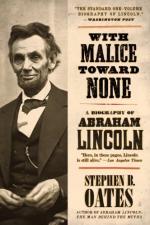|
This section contains 468 words (approx. 2 pages at 400 words per page) |

|
Part Four: Revolt Against the Fathers Summary and Analysis
The Missouri Compromise was a line dividing the north and south, above which slavery was illegal and below which it was legal. When the Kansas-Nebraska Bill was passed, it left the status of slavery up to the people who settled in the territory: They could either legalize slavery or ban it, which was Stephen A. Douglas's idea of popular sovereignty. Originally slavery was not going to be allowed in the West, but the Bill left that decision up to settlers. Many free-soilers were outraged, led by Salmon Chase, who claimed the Founding Fathers abhorred slavery and set restrictions so it would eventually die out. Lincoln was with the free-soilers: he believed Douglas had allied with Southern leaders to gain his own ends, and turned a blind eye to the morality of...
(read more from the Part Four: Revolt Against the Fathers Summary)
|
This section contains 468 words (approx. 2 pages at 400 words per page) |

|




